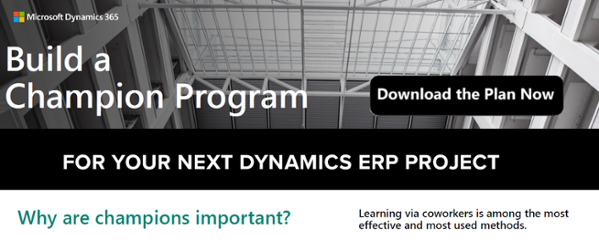[Updated 9/6/16] ERP implementation failure is common not only among the entrepreneurs who don’t know how to properly integrate an ERP system into their companies, but also among ERP vendors. That’s because it can be a task of Herculean proportions, especially if the system must be configured to meet specific needs and demands, although implementing an ERP system from scratch has become less of a risk over the years. Further, ERP systems are built differently, which means that they come with certain particulars that must be considered before implementation.
know how to properly integrate an ERP system into their companies, but also among ERP vendors. That’s because it can be a task of Herculean proportions, especially if the system must be configured to meet specific needs and demands, although implementing an ERP system from scratch has become less of a risk over the years. Further, ERP systems are built differently, which means that they come with certain particulars that must be considered before implementation.
Why Does ERP Implementation Fail?
To avoid ERP implementation failure, you have to understand why it happens in the first place. A recent study conducted by industry experts highlight three main reasons for the failure of most ERP projects: 1) poor planning; 2) lack of management support; and 3) changes occurring during the implementation process. Luckily, the same experts have issued a series of recommendations for how to avoid ERP implementation failures, regardless of the ERP solutions businesspeople choose for their organizations.
Prerequisites for Success
The following prerequisites are required for successful ERP implementation.
- Organizational Commitment: Your employees must change the way they work in order to take advantage of the technology advancements included in the ERP system you intend to integrate into your organization. If your employees aren’t strongly committed to your new goals, they’ll find many creative ways to keep things the way they are, and the potential capacity of the new ERP solution will be wasted.
- Communication: Another key element that can help you avoid ERP implementation failure is clear communication of strategic goals. By simply communicating your goals, you allow your management team to get a clear picture of your organization’s desired future and to understand why an ERP system must be implemented.
- Planning: Developing a plan of action is very important not only for setting new goals, but also for establishing the implementation phases. Typically, the phases of an ERP implementation plan include pre-evaluation, gap analysis, re-engineering, customization, screening, testing, and post-implementation activity, including user training. This also includes go-live. While it may make sense to go live during a slow time such as January 1st, please realize this may lead to failure due to the fact that key employees will most likely not want to work on a holiday.
- ERP Software Selection: Since the ERP solution will impose its own logic on your business strategy, it’s imperative to select and implement a system that can help you overcome your competitive weaknesses.
- Data Accuracy: Having accurate data before ERP implementation begins is an absolute requirement for the new system to function properly. This is even more critical for the companies that plan to implement an ERP system across multiple sites, because data inaccuracy may prevent organizations from standardizing specific processes, which can hinder productivity.
Given that the aforementioned prerequisites are satisfied, here are five critical success factors you should consider to avoid ERP implementation failure.
- Get Leadership Support: Besides the fact that ERP implementation can be very costly, it implies high stress, long working hours, and many problems that must be solved within specific timeframes. You will not be able to deal with all these without the support of your leadership team.
- Create Your Implementation Team: To ensure successful ERP implementation, your cross-functional team should include the most knowledgeable and skillful workers. Only these employees are able to identify, assess, and rethink existing processes to prepare your organization for the “big shift” and prevent ERP implementation failure.
- Develop an Implementation Schedule: An implementation plan is useful especially when the ERP system is installed in a phased approach. Additionally, establishing milestones makes possible project progress measurement, enabling you to minimize resistance to change during the implementation process.
- Apply Change Management Techniques: For a successful ERP implementation, your employees must understand how the new system will benefit both the company and their work lives. For this, you need to explain any new company objectives together with the opportunities that might arise from ERP implementation.
- Provide Extensive Training: Preventing ERP implementation failure is almost impossible if users don’t know how to operate the new system properly. Having staff capable of handling any problems that may occur within the new framework is very important to ensure continuous operability.
These points can help you turn any ERP project into a resounding success - a critical aspect for any leader responsible for the success or failure of an ERP initiative.
Get the Return on Investment You Need
Companies that invest in implementing solutions, such as Acumatica Cloud ERP, or Dynamics 365 quickly realize a return on their investment. These ERP solutions are easier to customize than previous legacy solutions. Find out more about the software costs.
About Clients First
Business software should increase productivity, improve profitability, and be easy for staff to use. Most of today’s ERP solutions are good at finance and have horizontal niches for distribution, manufacturing, maintenance, repair, and overhaul (MRO) for aviation and heavy equipment. This makes searching for a software solution more about what the implementation partner can do to help you get the most out of the system. That is why Clients First is not a software company--we are a business solutions and services company.
Contact Clients First Business Solutions to learn more about the right ERP solution for your business to help you get the most ROI out of your 2021 budget.
Email: Dallas/Fort Worth, Texas or call us at 800.331.8382
 How to Avoid ERP Implementation Failure">
How to Avoid ERP Implementation Failure">
